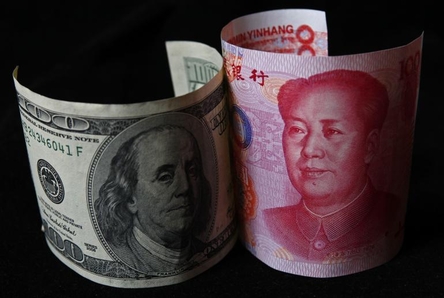
Have you been lying awake at night, fretting over the news that China has surpassed the United States to become the world's largest economy? If so, let me offer some reassuring advice: Turn over and go back to sleep.
The International Monetary Fund's most recent compilation of global economic data isn't exactly a page-turner, but buried among its eye-glazing statistical appendices was a detail that had some financial writers hyperventilating. In 2014, the IMF estimates, China's economic output will total $17.6 trillion, putting it slightly ahead of the United States, where GDP this year is valued at $17.4 trillion. That means China now exercises 16.5 percent of the world's economic clout, outranking the United State, with 16.3 percent.
Assuming the IMF's calculations are right, the flustered headlines aren't surprising. "It's official: America is now No. 2," announced MarketWatch. "China just overtook the US as the world's largest economy," a Business Insider story was titled. Vanity Fair's forthcoming issue proclaims this "The Chinese Century" — and illustrates it with an image of a panda crushing an eagle.
But what if those IMF calculations aren't right? Or to be more precise, aren't all that meaningful?
The standard yardstick for measuring and comparing different economies is to convert each country's data into a common currency (typically the US dollar), using prevailing foreign-exchange rates. By that benchmark, China's economy still lags well behind America's, by roughly $7 trillion as of 2014.
It is only by expressing each country's GDP in terms of what analysts call "purchasing-power parity," or PPP, that China can be portrayed as the foremost economic power on Earth. This is a way of adjusting the value of national currencies to account for different costs of living in different countries. The intention is to yield a value that makes comparisons more realistic, at least in terms of buying power — "so a Starbucks venti Frappucino served in Beijing," as MarketWatch's Brett Arends puts it, "counts the same as a venti Frappucino served in Minneapolis, regardless of what happens to be going on among foreign-exchange traders."
But while purchasing-power parity is a useful theoretical concept, it isn't money in the bank. Theoretical concepts can't be spent. The Chinese can't use PPP currency to pay for airplanes and oil and computers. They have to pay, like everyone else, in real currency at prevailing exchange rates. And by that measure, the United States remains the most potent economic force on the planet.
More to the point, China is nowhere near outstripping America in per-capita terms, the most important gauge of a nation's economic strength.
With a population nearing 1.4 billion, China has a vast distance to cover before its economic output per person begins to resemble America's. According to the IMF, China's economic output this year — after adjusting for purchasing power — will amount to $12,893 per person. The comparable value for the United States is more than four times as much: $54,678. Even a booming Chinese economy will need time to close such a yawning gap. It took Americans almost 75 years to pull it off. China's per-capita GDP stands today where America's stood in 1940.
And China faces a daunting challenge. Its fertility rate has fallen sharply, and its population is aging. In 1980, its median age was 22; today it is 35; by 2050 it is likely to reach 49. With fewer children being born today, China's workforce will shrink tomorrow, even as its population of nonworking elderly swells. As the Economist observes, "China will grow old before it gets rich."
That isn't a prospect we should relish. There is no competition for the title of World's Largest Economy; with or without the "We're No. 1" bragging rights, Americans' quality of life will remain high. We should welcome other people's progress up the economic ladder, just as we welcome their advances in democratic liberties and human rights. And we should regret any handicap that impedes their gains — whether that handicap is an authoritarian Communist government or a looming demographic collapse.
A world of burgeoning GDPs will be a happier, healthier, cleaner, and more educated world. Nearly one-fifth of the human race lives in China, and the better off those men, women and children are, the better off we're all likely to be. When other nations prosper, America isn't the poorer.
China ranks No. 1 in some things — population, exports, electricity, telephone use. By the most meaningful standard, however, its economy is still far from the world's most largest. Will it get there one day? Let's hope so.
Comment by clicking here.



 Contact The Editor
Contact The Editor
 Articles By This Author
Articles By This Author